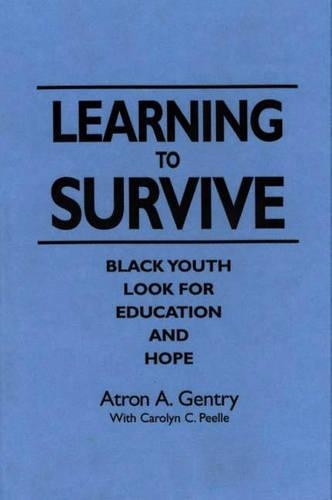
Learning to Survive: Black Youth Look for Education and Hope
(Hardback)
Available Formats
Publishing Details
Learning to Survive: Black Youth Look for Education and Hope
By (Author) Atron A. Gentry
By (author) Carolyn Peelle
Bloomsbury Publishing PLC
Praeger Publishers Inc
26th July 1994
United States
Classifications
Tertiary Education
Non Fiction
Ethnic studies / Ethnicity
Age groups: children
Age groups: adolescents
Biography: philosophy and social sciences
371.9796073
Physical Properties
Hardback
192
Description
This book presents the experiences and ideas of a leading black educator, interweaving his autobiography with the stories of contemporary street gang members and former members. Their own words illustrate Gentry's thesis that even the hardest gang members want to get an education and want to find The Hope Factor. In addition, the book offers an approach for dealing with the greatest challenges facing the nation today: urban violence and the miseducation of minority youth. Gentry begins by outlining his major themes and then examines American urban education, using his own personal history as well as his more than 25 years of experience in the field. He then provides exemplary case studies and proposes practical solutions. The book is addressed to future teachers and administrators as well as to those now in urban schools, and to all concerned with the state of urban and minority education.
Reviews
"The research in this book addresses complex problems using the power of simplicity. Atron tells the stories of street gang members and simply says, 'These are America's children. They want a chance like anyone else. We all need hope.' Atron writes as an education professor and as a black male raised up and schooled in America. Learning to Survive shows us school and street truths, from both the inside and the outside. Ever since I met Atron, I have admired how he creates hope in his life and his work. He has always kept a shy distance, respecting my celebrity. I am very, very proud to contribute to this book and be a part of 'The Hope Factor.'"-William H. Cosby, Jr., Ed.D. (from the foreword)
Gentry and Peelle survey the devastating conditions in which our children try to survive. They explain 'The Hope Factor' concept and define self-esteem and self-worth....Extensive bibliography. Recommended for beginning teachers and educators in multicultural classrooms.-Choice
This book presents the experiences and ideas of a leading black educator about how to deal with the greatest crisis this nation has faced: urban violence and the miseducation of minority youth. Gentry relates personal stories as well as those of past and present gang members who struggled to find 'The Hope Factor' through education. Hope and help for America's greatest resource, her children, are the powerful messages that are the basis for Gentry's work both as a writer and an educator.-The Black Scholar
"Gentry and Peelle survey the devastating conditions in which our children try to survive. They explain 'The Hope Factor' concept and define self-esteem and self-worth....Extensive bibliography. Recommended for beginning teachers and educators in multicultural classrooms."-Choice
"This book presents the experiences and ideas of a leading black educator about how to deal with the greatest crisis this nation has faced: urban violence and the miseducation of minority youth. Gentry relates personal stories as well as those of past and present gang members who struggled to find 'The Hope Factor' through education. Hope and help for America's greatest resource, her children, are the powerful messages that are the basis for Gentry's work both as a writer and an educator."-The Black Scholar
Author Bio
ATRON A. GENTRY is Professor of Education, School of Education, University of Massachusetts at Amherst. He is the co-editor of the journal Equity and Excellence in Education and Urban Education. CAROLYN C. PEELLE has a doctorate in urban education and has written articles and books on issues of access and equity in education.
